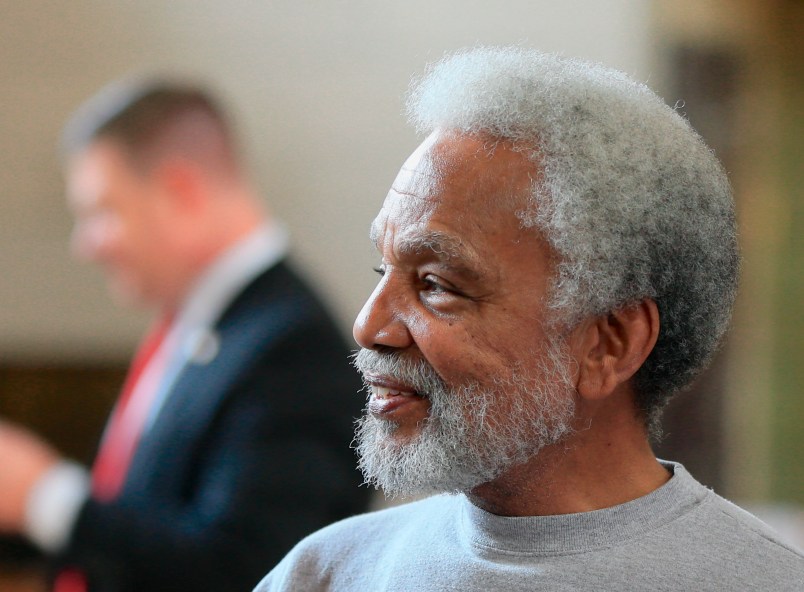LINCOLN, Neb. (AP) — Nebraska lawmakers gave final approval on Wednesday to a bill abolishing the death penalty that would make it the first conservative state to do so since 1973 if the measure becomes law.
The vote margin in the unicameral Legislature was more than enough to override a promised veto from Republican Gov. Pete Ricketts, a staunch supporter of capital punishment, who said that it was a “dark day” for public safety.
“Nebraska has a chance to step into history — the right side of history — to take a step that will be beneficial toward the advancement of a civilized society,” said Sen. Ernie Chambers of Omaha, an independent who has fought for four decades to the end the death penalty.
The Nebraska vote marks a shift in the national debate because it was bolstered by conservatives who oppose the death penalty for religious reasons, cast it as a waste of taxpayer money and question whether government can be trusted to manage it. Traditionally, law-and-order conservatives in the United States have stood among the strongest supporters of the ultimate punishment.
Nebraska hasn’t executed a prisoner since 1997, and some lawmakers have argued that constant legal challenges will prevent the state from doing so again.
“It’s certainly a matter of conscience, at least in part, but it’s also a matter of trying to be philosophically consistent,” said Sen. Laure Ebke, a Republican from Crete. “If government can’t be trusted to manage our health care … then why should it be trusted to carry out the irrevocable sentence of death?”
Ricketts has promised to veto the bill, requiring an override vote likely to take place next week. The governor announced last week that the state has bought new lethal injection drugs to resume executions.
“This is a case where the Legislature is completely out of touch with the overwhelming majority of Nebraskans that I talk to,” Ricketts said.
Ricketts, who is serving his first year in office, argued in his weekly column Tuesday that the state’s inability to carry out executions was a “management problem” that he is committed to fixing.
Maryland was the last state to end capital punishment, in 2013. Three other moderate-to-liberal states have done so in recent years: New Mexico in 2009, Illinois in 2011, Connecticut in 2012. But the last conservative state to do so was North Dakota in 1973. The death penalty now is legal in 32 states, including Nebraska, and the federal government.
Nebraska lawmakers passed a death-penalty repeal bill once before, in 1979, but it was vetoed by then-Gov. Charles Thone.
Death penalty supporters tried to prevent the vote with a legislative filibuster, arguing that capital punishment is rarely used in the state but should remain on the books for the most heinous crimes.
“What is in the right hand of lady justice? It isn’t a set of keys,” said Sen. Beau McCoy, of Omaha. “In the left hand are a set of scales, scales of justice. In the right hand is a sword. It’s not a set of keys to a cell block for life in prison.”
The vote was a milestone for Miriam Thimm Kelle, who started lobbying Nebraska lawmakers to abolish the death penalty a decade ago. Her brother, James Thimm, was tortured and killed on a Nebraska farm in 1985 by a man who is still awaiting execution because of repeated legal challenges.
Kelle said she hopes repealing the death penalty will put the issue to rest and encourage the public to forget about the man who murdered her brother.
“It’s been going on for 30 years, and nothing has changed,” she said. “Just put James to rest. Thirty years is enough.”
__
Associated Press writer Anna Gronewold contributed in Lincoln.
Copyright 2015 The Associated Press. All rights reserved. This material may not be published, broadcast, rewritten or redistributed.







Wow, good for them. I hope that they remain firm and override the veto.
“It’s certainly a matter of conscience, at least in part, but it’s also a matter of trying to be philosophically consistent,” said Sen. Laure (sic) Ebke, a Republican from Crete. “If government can’t be trusted to manage our health care … then why should it be trusted to carry out the irrevocable sentence of death?”
Damn! A conservative trying to be philosophically consistent. Pardon me while I grab my binos, go outside, and look for flying pigs.
Seriously, my hat’s off to them. And Ricketts is a world-class dick.
Rachel said it was going to be a race between this bill and the death penalty drugs Ricketts ordered from India ($51K + $3K S&H) to see which got delivered to the Guv’s desk first.
Good job on this one NE lawmakers and congrats to Senator Chambers … his decades of work on this finally paid off.
Now what might happen to the NE taxpayer-funded $54K in drugs … resell them to TX and OK?
Since it typically costs three to five times as much money to execute someone as it does to incarcerate them for life, one would think that Republican-controlled states, with their professed love of “fiscal responsibility”, would be rushing to eliminate the death penalty.
One would also think that since Republicans tend to believe that the government can’t do anything right, that eliminating the death penalty would make sense from a moral perspective.
But dammit, Republicans love killing and they really love state-sponsored killing. That usually trumps both fiscal and moral imperative.
I thought the families of the Boston Marathon Bomber victims had a helluva point - every time there’s an appeal the case is publicly reopened, reporters contact them, they have to go before a court or sit through hearings. The rest of their lives are dedicated to this cause, even when they don’t want it. How much better would it be to put killers in max security surrounded by televised photos of their victims so they can’t turn anywhere without seeing the person whose life they took?